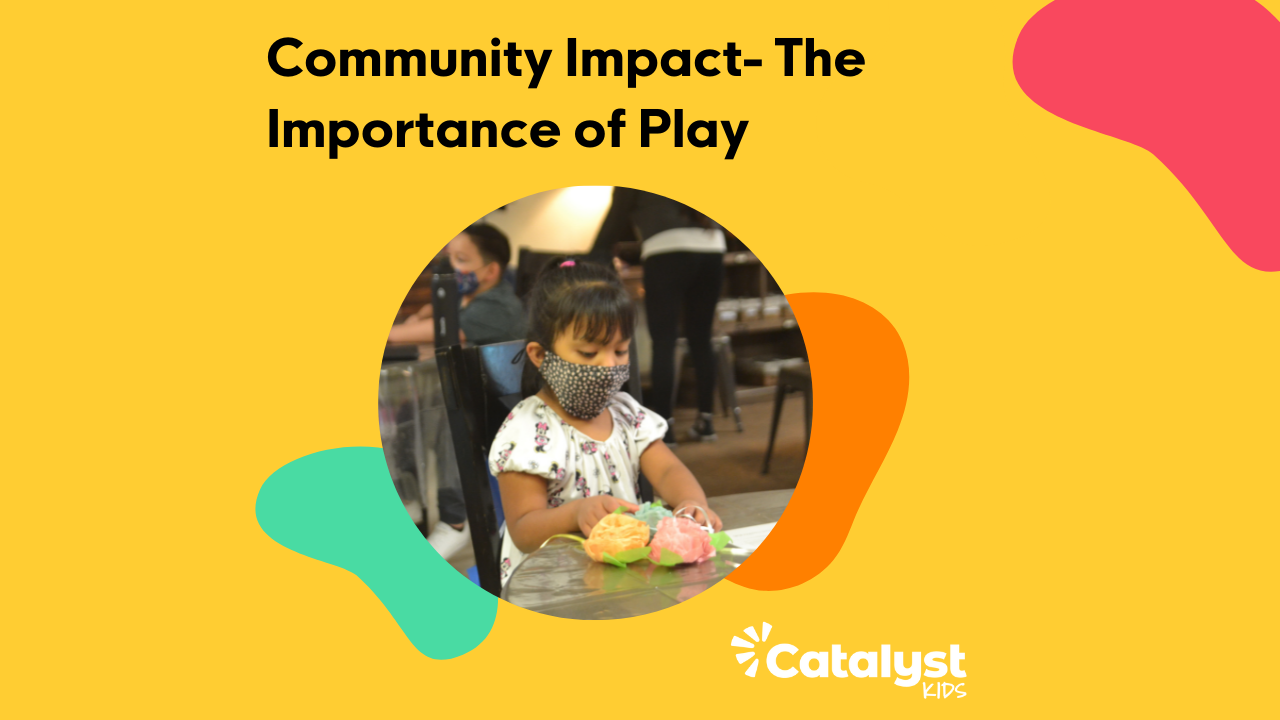October 25, 2021
Community Impact: The Importance of Play
By Sarah S

Ralph Waldo Emerson once said, “It is a happy talent to know how to play.” For most children, play is instinctive, often easy. For others, play is approached cautiously, with guarded apprehension.
At Catalyst Kids, I have had the privilege of knowing both types of children. My happiest times as a teacher have been helping my most reluctant little ones to engage actively and wholeheartedly in play through targeted social/ emotional skill practices. This submission is about a girl named Reese, a Kindergartener who, with support and time, gained the confidence to engage in flexible play, learned the social rules of engaging in group play, and practiced the character-building exercises of compromise and compassion, while engaging in all manner of imaginative play.
Reese was one of my first students in my first classes as a Catalyst Kids teacher. She was bright, funny, and headstrong. Her family informed us that she “ruled the roost” and led much of the family’s free time. As such, she was a great leader but had truly little experience in following- an essential skill in group play. We discovered that if she could lead, little went wrong in her playtime, but if anyone else tried to take charge, there would undoubtedly be a meltdown. Reese struggled with emotion regulation, naming her feelings, and talking them out, and with compromise. I was determined that my class would be one where Reese would learn how to win and lose with grace. I wanted her to find joy in following, as much as in leading. I wanted to give her words for the things she was feeling and help her navigate through them.
Where could I start? I could start where all things start with children: in play.
Utilizing Academic Enrichment time, we began engaging in games like “Greater Than/Lesser Than battles”. We wouldn’t keep score to start because repetition was the key. The instant gratification of winning a hand, followed by a quick work-through of negative feelings when she lost, only to be given the immediate chance to win again was a thrill that worked wonders for Reese. She learned then that winning and losing were not constant states- a person’s luck could turn at any moment. This helped her begin to win and lose more gracefully.
Applying 30 Minute Fit time, we began playing team games like “Indoor Tennis” where a net comprised of ribbon separated two groups of students, chosen completely at random. Each team took turns serving and returning the balloon ball, whacking it over the ribbon with a paper plate and wooden popsicle stick paddles. The team worked together to give everyone a job, to call out when they were going to go for that balloon, and to celebrate and encourage one another. This game helped Reese become part of a bigger organism, a class/family as I liked to call it.
Open Recreation time was where the bulk of our work with Reese was done, unbeknownst to her. Reese had won over her classmates through the previously mentioned exercises. She had a much better handle on her emotional regulation, she could name her feelings and interrupt her own negative habits. Reese had learned to celebrate her friends’ wins and encourage them in their losses. Because of these strides, her classmates were more than eager to include her in their free playtime. This block of uninterrupted play allowed Reese to engage in imaginative play. Sometimes Reese was the princess, and sometimes she was the villain. For a moment she was brave, and in the next, she would be the timid baby of the group- all for play. Reese came to understand that leading was fun but following some of the ideas of her friends could be great fun as well.
Catalyst Kids provided the framework for a whole-child approach for learning and succeeding for Reese. Through play, she grew as an individual and that meant that the group grew. Play is empowering and freeing, all at once. Reese learned that first-hand through what began as guided play and blossomed into her own place among her friends through free play. I will always remember the great strides she took in her social and emotional development through the Catalyst Kids program structure.